We all remember our own high school relationships, and now it’s our children’s turn. As a father of two, I understand the worries about what happens in high schools and how these early experiences can shape teens’ futures. The big question many parents (and maybe teens) ask is: What percent of high school relationships last? The truth is, most don’t go the distance, though some do.
Research published by the CDC indicates that marriages under age 18 have a 10% breakup risk after one year, rising to 29% after five years.
In this post, I’ll share what I’ve found about high school relationships, how long they last, why some survive, and what lessons they leave behind. My goal is to give you a clear picture of what teen love looks like and how we as parents can support our children through it.
Listen to this Podcast about high school relationships:
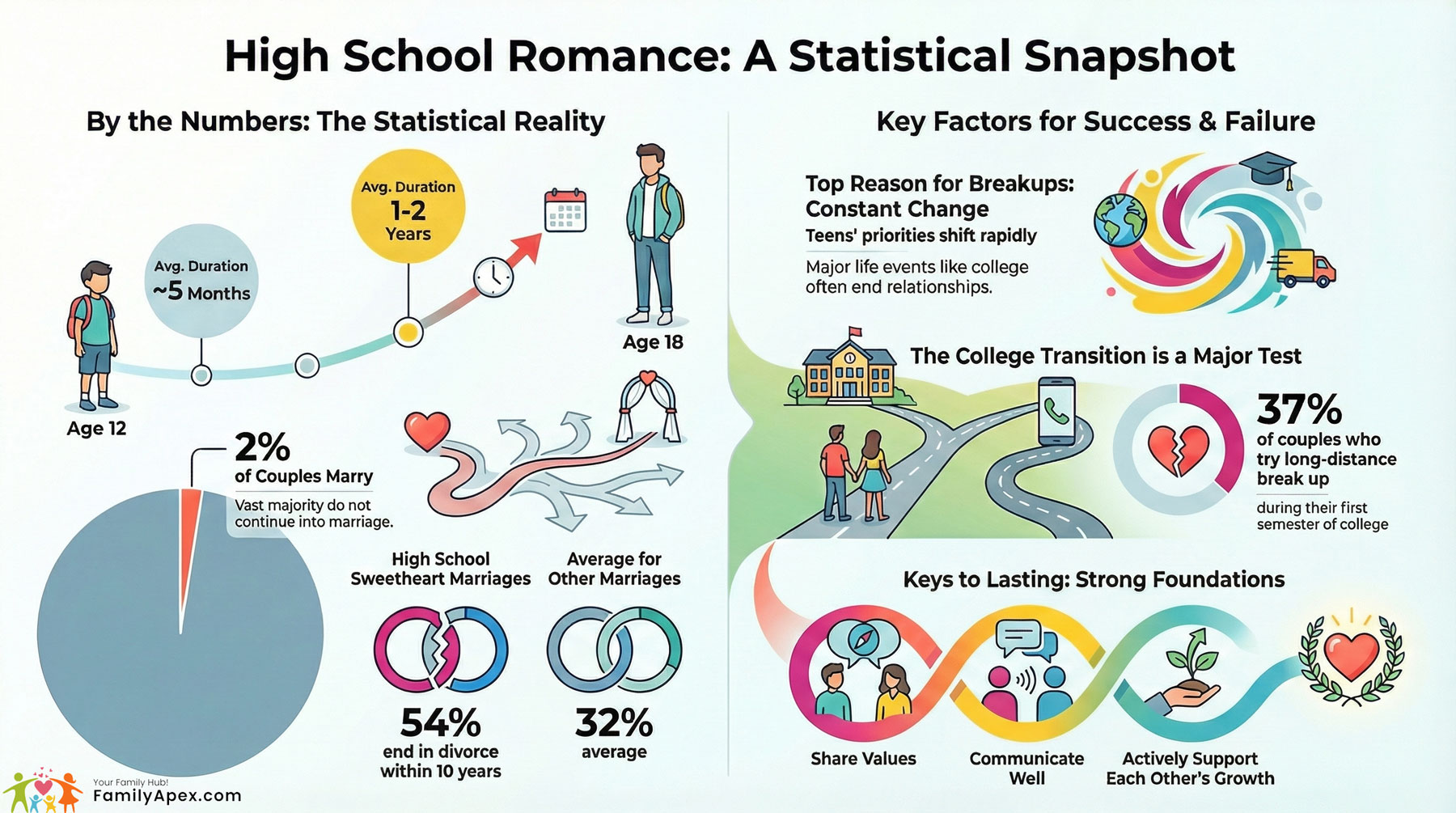
What Percent of High School Relationships Last?
High school relationships usually do not last that long. However, the duration they continue depends on a variety of factors. Among those factors, we can indicate family support, personality, environmental changes, communication skills, and age. According to a study published by the National Institute of Health, on average:
- Relationships for early teens (12–13) last about 5 months.
- By 14–15, the average grows to around 8 months.
- At 16, many relationships last about 6 months.
- Older teens (17–18) can stay together for closer to 1–2 years.
These numbers may still vary for different couples. So, they are not 100 percent sure. But the majority of high school relationships fall in these categories.
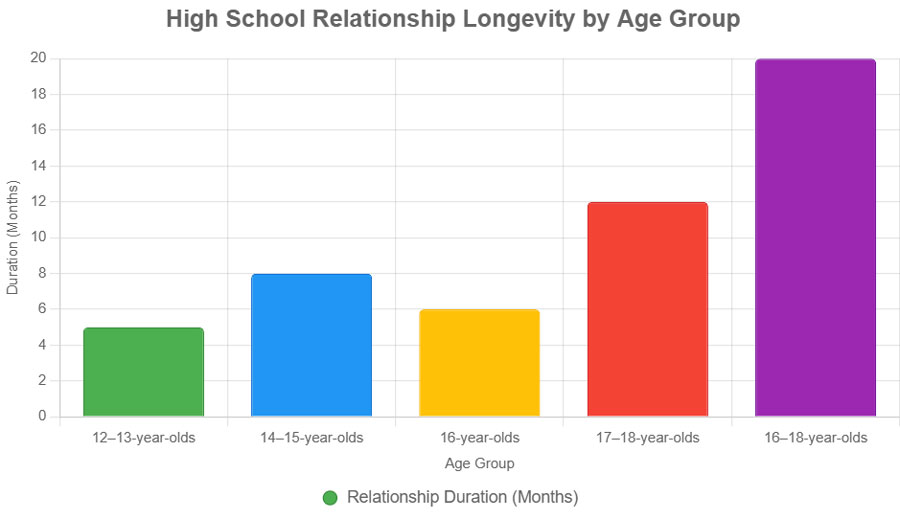
Why Most High School Relationships Don’t Last
Teenagers typically rely on their high school relationships too much. They feel they have crafted the most powerful love story, but only a few last till adulthood.
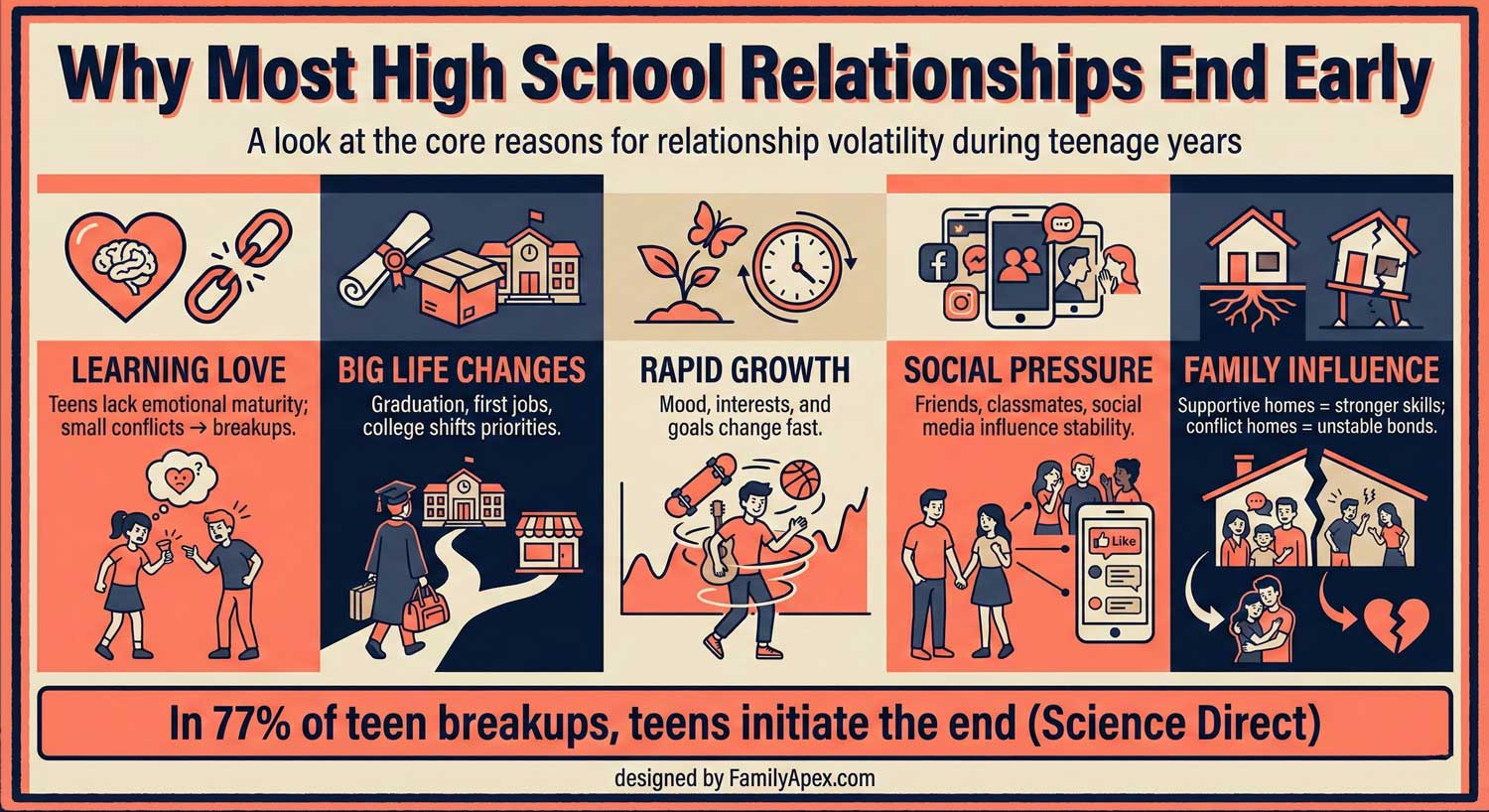
Let’s get together the reasons why high school relationships do not last as the teenagers expect them to:
1. Need to learn What Love Is
At the age of being in high school (15,16, or 17), teenagers try to discover their feelings and manage their emotions. They need to find out what responsibility, trust, and respect mean precisely while encountering disagreement. In such a situation, even the smallest conflicts turn into split-ups.
According to a study at Science Direct, in 77% of teen breakups, it’s the teenager themselves who decides to end the relationship.
2. Teens Are Not Tolerant of Big Changes
High school is full of events that can turn a teen’s life into a new direction. Think of graduation, getting the first job, and going to college. They all change a teenager’s mind about love and relationships. What was really important to them once is not anymore on the way.
3. Teens Grow and Change Quickly
Teenagers change a lot in just a few years. Their moods, interests, and goals shift as they grow, and this often affects their relationships. Some examples include:
- Teens’ moods change quickly. They may feel full of energy one day and down the next.
- Priorities often shift. What matters at 15 might not matter anymore at 17.
- At 16, many focus on sports, friends, and having fun.
- By 18, many begin thinking more about college, careers, and the future.
As teens grow older, their relationships tend to become more exclusive, more emotionally intimate, and longer-lasting (Source: University of Minnesota)
4. Social Impacts & Pressure Change Things
Teens are influenced easily by various factors, including classmates, friends, social media, etc. These factors also impact their emotional relationships. They may easily break up under outside pressure, or vice versa, make them last longer.
5. Family & Communication Skills Are Effective
Parents play a big role in how teens handle relationships. A safe and positive home helps them build the skills they need for love and communication. Here is how the family members can affect teens:
- A supportive home gives teens better communication and problem-solving skills.
- Positive family life helps them build healthier and less stressful relationships.
- Homes with a lot of conflict often lead to less stable relationships in high school.
Research on Institute for Family Studies show that teens from stable two-parent homes until at least age 14 are more likely to have early marriages that last.
Below is a simple table showing why high school relationships usually don’t last:
| Reason | Core Issue | Impact |
| Learning Love | Teens lack teen emotional maturity for trust, respect. | Minor fights cause teen breakups. |
| Life Changes | Graduation, college shift high school relationships. | Love priorities fade. |
| Rapid Growth | Moods, goals change fast in teen relationships. | Partners drift apart. |
| Social Pressure | Friends, media sway high school love. | Breakups or forced longevity. |
| Family Influence | Supportive homes teach relationship skills for teens. | Weak homes destabilize bonds. |
Why Some High School Relationships Do Last
Even though many high school love stories end in the same duration of time, some can last longer than expected.
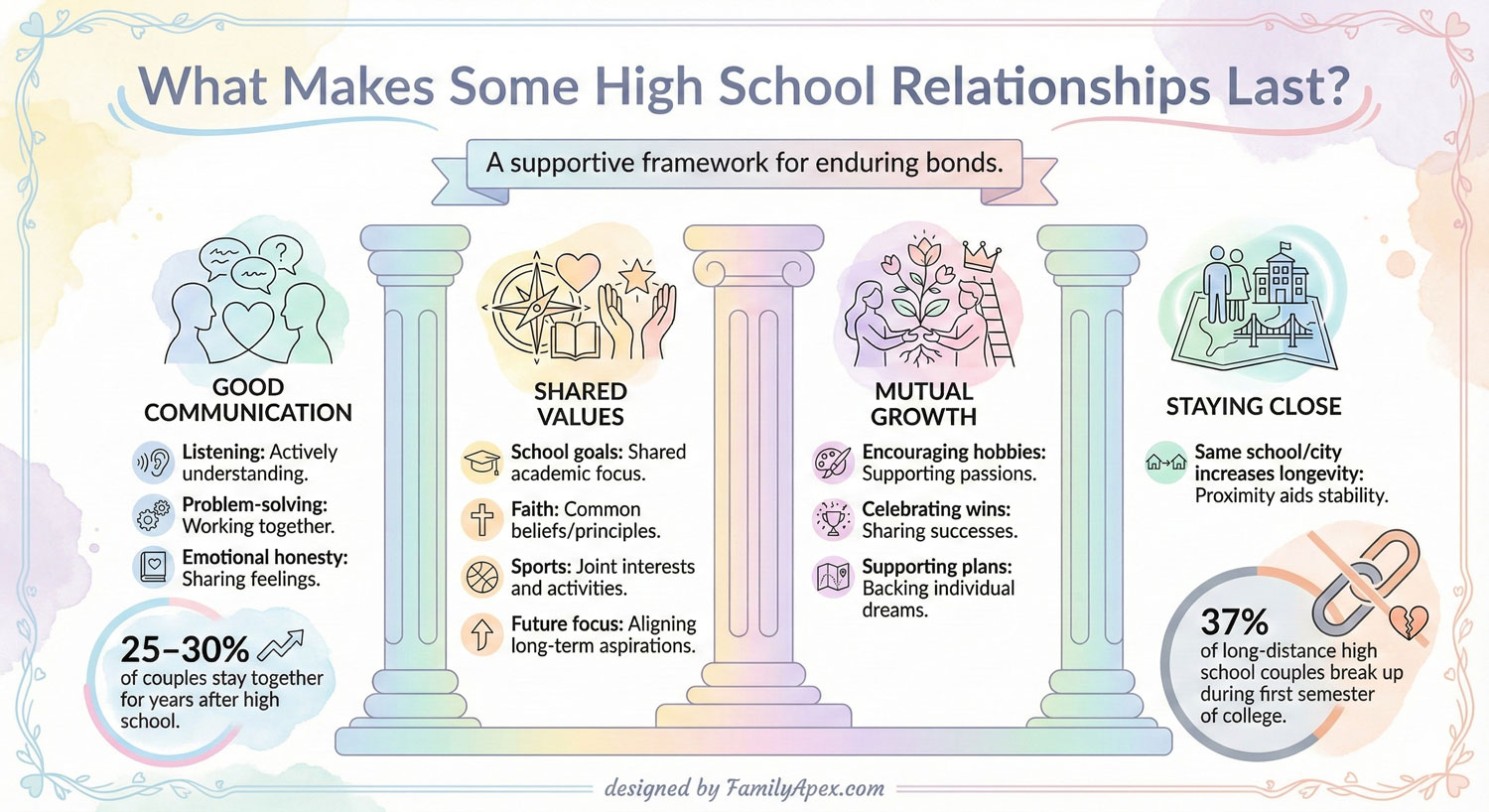
The couples who make their romance linger for longer, share the following traits:
1. Good Communication Builds Trust
Every relationship will last longer when couples listen to each other, talk openly once in a while, and cope with challenges together. Now, high school loves are not an exception. Research shows that communication skills during the teenage years can also lead to powerful relationships in adulthood.
2. Shared Values Keep Couples Aligned
Couples with similar interests or goals, such as focusing on school, sports, or faith, usually connect more strongly. Having common goals and priorities makes it easier to grow together instead of growing alone.
3. Supporting Each Other’s Growth
A good teen relationship means both partners grow together, side by side, shoulder by shoulder. You encourage each other for improvements, whether at school or in hobbies. That’s like teamwork that has no result other than success. Here are some ways teens support each other:
- Encourage personal interests and hobbies to create teamwork.
- Back each other’s future plans to strengthen the connection
- Celebrate small successes together to make the bond stronger.
4. Distance in Young Love
Relationships are more likely to last when couples stay in the same school, city, or college. Research shows that about 25–30% of high school couples stay together for a few years after graduation (Source: Online Divorce).
Long-distance relationships are intolerable at this age, and many break up soon after high school when distance becomes a challenge. According to a 2024 study published on NIH, about 37% of high school couples who try long-distance break up during their first semester of college.
Do High School Sweethearts Get Married? (What the Data Can Tell Us)
The short answer is yes, they can. However, it is rare and may even cause some issues.
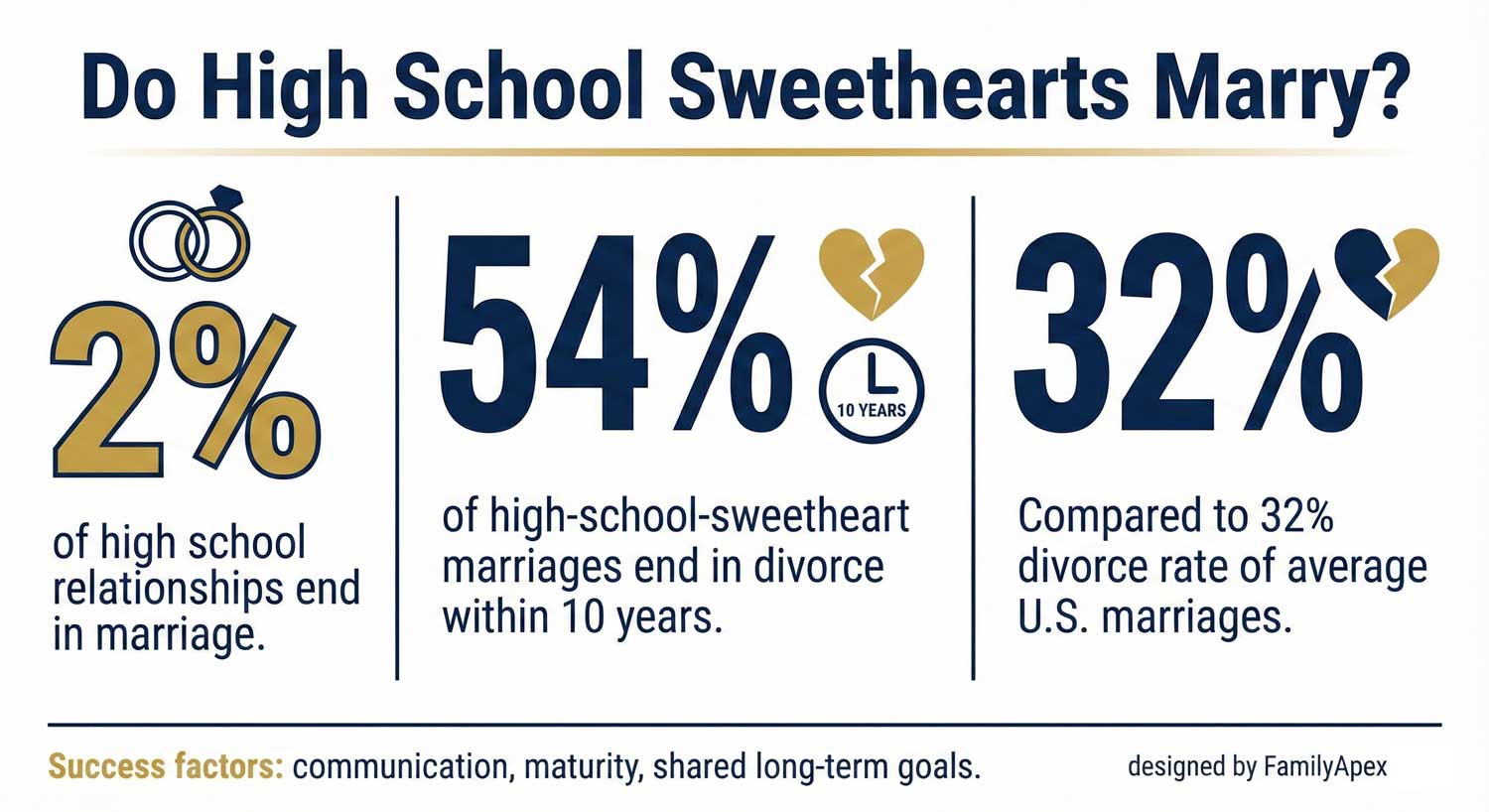
You must consider a few points about marriage driven from a high school romance, which I will share below:
- Very few last that long: Studies suggest that only about 2% of high school relationships end in marriage (The Post).
- Marriage is tough when it starts too early: Many teens who marry young face big challenges like money problems, lack of life experience, and not being fully ready for the responsibilities of marriage.
- High divorce rates: Even when couples do marry, about 54% of high school sweethearts end up divorcing within 10 years (Brandon Gaille). That’s much higher than the 32% divorce rate for average U.S. marriages over the same period (Red Lasso).
- What helps couples succeed: The ones who do last often share deep respect, good communication, and long-term goals that match.
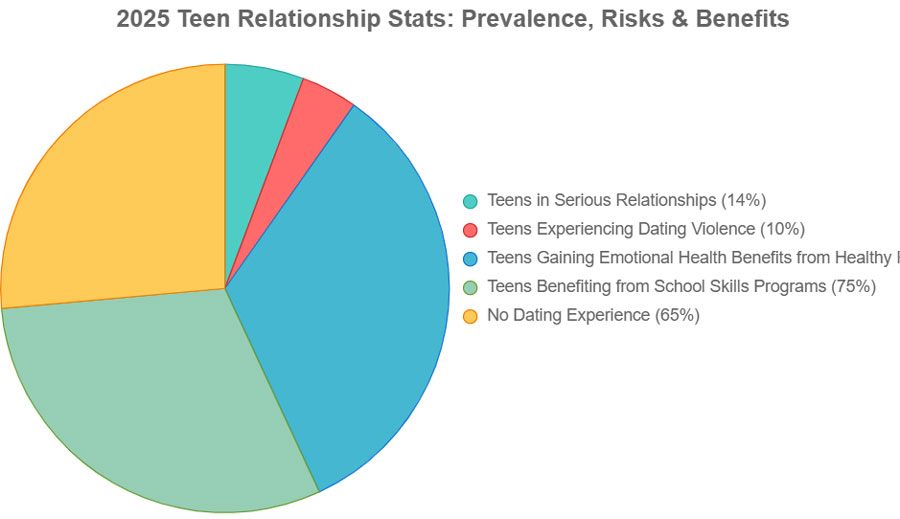
How Teen Relationships Affect Future Love and Life
Although it may not be that deep, high school relationships still have much to teach teenagers under the surface. They leave behind lessons that help teens grow into stronger, healthier adults. I have listed these valuable lessons in the following:
1. Learn Empathy and Emotional Growth
In a romantic relationship, they learn how to care about others feelings rather than their own. They start to see how their words and actions can hurt or help a person. Even if that love story won’t last long, it builds trust and hope in their future relationships.
2. Understand Personal Boundaries
High school love also helps teens learn what feels right and what doesn’t. They begin to see the importance of setting boundaries, which protects their well-being and prepares them for healthier relationships later. Here are some of the boundaries they start to recognize:
- The need for personal space
- The value of two-sided respect
- The right to say “no” when something feels wrong
- The importance of protecting their own well-being
3. Breakups Teach Strength
Breakups feel devastating, especially at that age. However, they learn resilience after a heartbreak. Human beings need to feel this pain, gain valuable experience from it, and try to move forward. This will prepare teens for bigger challenges on the road.
4. Gain Experience for the Future
Every relationship, even if it ends, provides practice for the future. Teens learn how to communicate, compromise, and balance their needs with a partner’s. These early experiences help them avoid mistakes later and increase their chances of having more stable and fulfilling relationships.
According to the Australian Institute of Health and Welfare, young Australians aged 15–24 rate their relationships about 8.5 out of 10, which means most teens and young adults see real value in these early connections.
Here’s a short table showing how teen relationships build future growth:
| Lesson | Core Skill | Future Benefit | Example |
| Empathy | Care for others in teen relationships. | Strong adult bonds. | Comforting partner’s bad day. |
| Boundaries | Space, respect in high school relationships. | Healthy adult love. | Saying “no” to pressure. |
| Resilience | Heartbreak builds teen emotional maturity. | Better life coping. | Moving on after breakup. |
| Skills | Communication in teen relationships. | Stable adult partnerships. | Compromising on date plans. |
Tips to Keep a High School Relationship Healthy
Usually, every teenager experiences high school relationships to some extent. They are exciting, fun, and new, but take effort and become challenging at the same time.
Surveys show that about 84% of teen relationships are considered committed or exclusive (National Institute of Justice). Here are some ways to make them stronger and healthier:
- A good relationship should help you move forward, not hold you back. Keep up with your grades, sports, hobbies, and future goals so your relationship can grow, too.
- Not every high school relationship will last forever. That doesn’t mean it isn’t real or important. Enjoy the time you share, but remember that change is normal.
- It’s easy to get caught up in a relationship and forget about yourself. Make sure you spend time with friends, keep up with your hobbies, and do what you love.
- Life after high school brings new challenges. You or your partner might get apart, start college, or begin working. Honest talks about changes can make it easier to handle.
- Arguments and misunderstandings will happen. What matters is how you deal with them. Listen to each other, show respect, and don’t let anger take over.
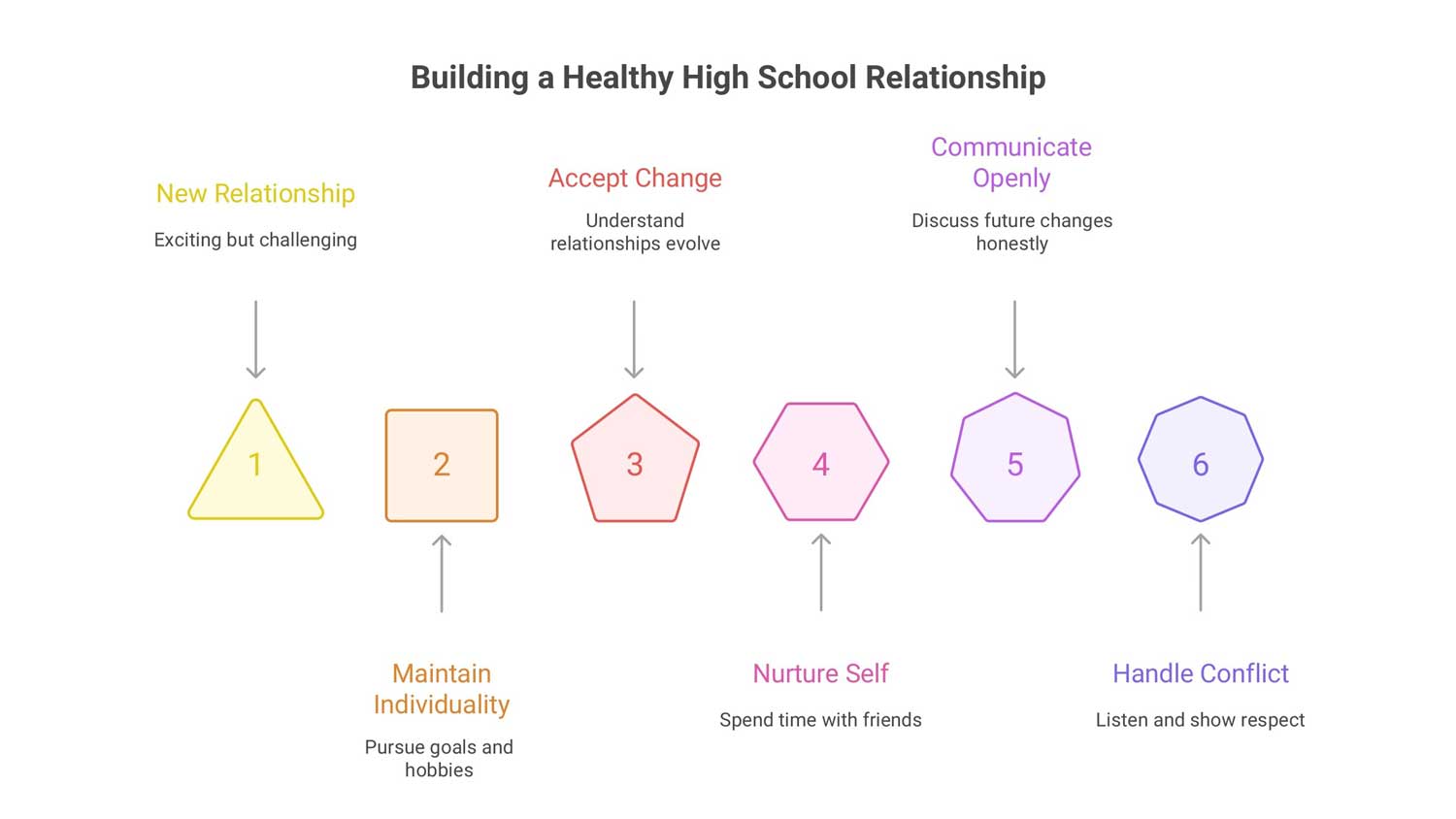
Common Misconceptions & Myths About High School Love
All parents and others believe in some non-real facts about high school romance. The following misconceptions and myths I’ve gathered are some of the most obvious ones that you should never believe:
➢ High School Relationships Never Last
Not every high school relationship is short-lived, some are long lasting and continue into adulthood. High school couples often stay together for years, and, as mentioned previously, 2 percent of them end in marriage later on.
Breakups in such relationships should not cover the real emotions that teenagers feel at this age. For many, these relationships are important stepping stones in learning how to love and connect with others in the future.
➢ First Love Is Always True Love
Every teenager assumes his/her heavenly love will last for good! That’s a really powerful feeling, but it changes through life’s ups and downs. People grow, move, and set new goals. The first love is special because it teaches what love feels like. However, it is not the only true one.
Most people find love again at different stages, and those later relationships are often stronger because of the lessons learned from the first.
➢ Breakups Mean Failure
A breakup might feel like the end of the world to a teenager, but it doesn’t mean the relationship was a waste. Every relationship, even one that ends, teaches something valuable. You learn about communication, boundaries, or what kind of partner you want in the future.
Breakups are the first steps in making relationships last afterward. Like the famous sentence that says failure is not the opposite of success; it’s part of success.
Where Teens Can Find Help for Relationship Problems
Relationships between high school students are not always as beautiful and colorful as we think. If you are a teen facing problems with your partner, do not forget the sources below to get expert help.
According to the Statistique Canada, about 45% of Canadian teens aged 15–17 report experiencing some form of dating violence. Parents should also tell their children about the following sources of professional help:
- Love Is Respect: A national program for teens. Offers articles, quizzes, and a 24/7 text or phone hotline.
- CDC Teen Dating Violence Resources: A government health agency. Shares facts and prevention tools for parents and teens.
- National Domestic Violence Hotline: A national 24/7 hotline for anyone who feels unsafe in a relationship. Call 1-800-799-SAFE (7233).
- Planned Parenthood: A nonprofit health organization. Offers teen-friendly info on consent, communication, and relationships.
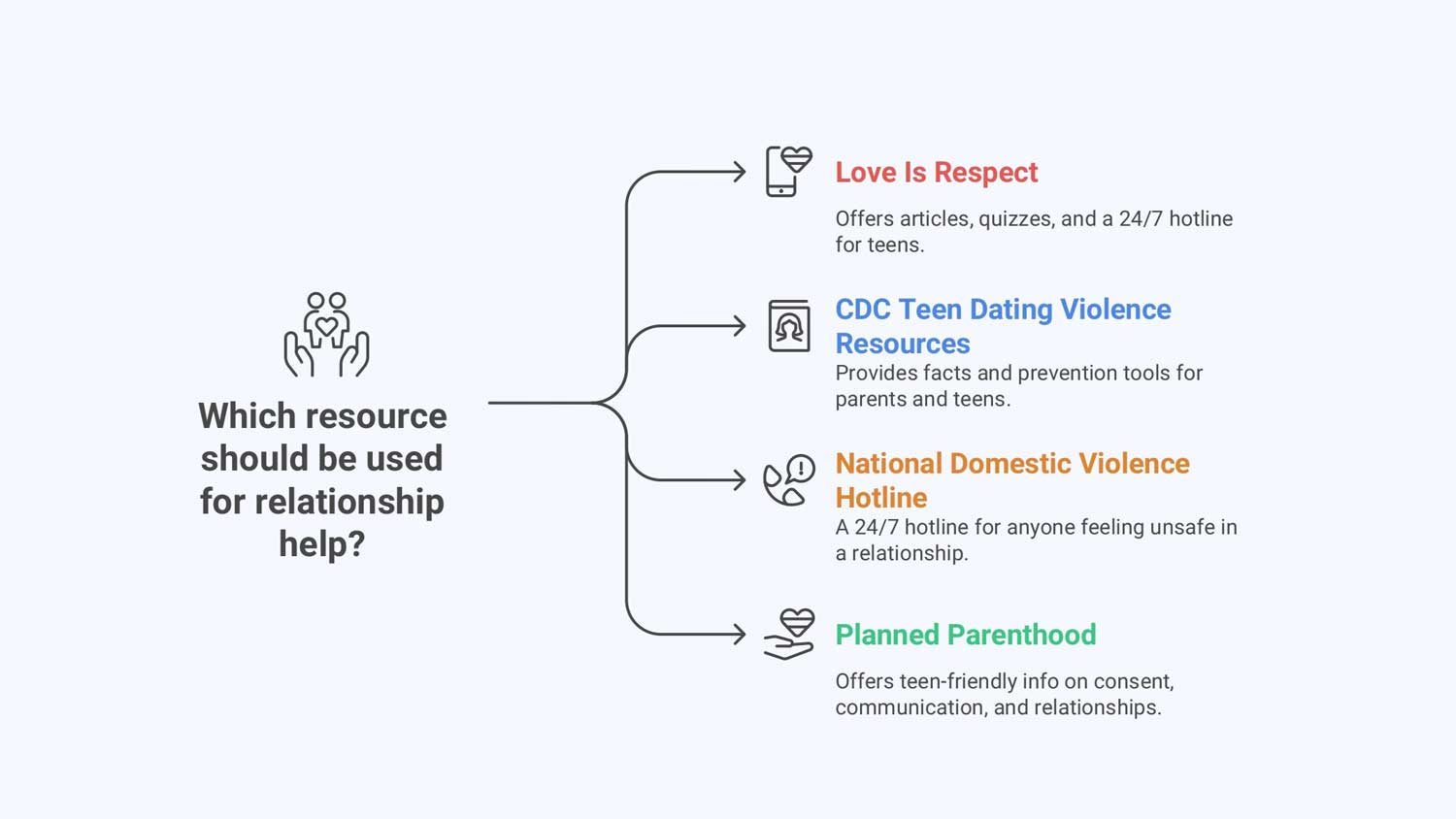
Final Thoughts
High school relationships do not typically last too long. However, a few may even result in a long-term marriage. Although they may not continue for good, they still play a crucial role in shaping the teen’s future. They will learn about trust, love, and respect, the key factors that guarantee a successful, healthy love story in their adulthood.
We, as responsible parents, can always support our children through this challenging time and help them pass with minimal damage. High school love may be short, but its impact can last a lifetime. Get in touch with us at Family Apex and share what you think more about high school love.
Frequently Asked Questions
1- What percent of high school relationships last?
Most high school relationships don’t last long, though a few continue into adulthood. They still matter because they help teens learn about love, trust, and respect.
2- Why don’t most high school relationships last?
High school couples often break up due to immaturity, big life changes like graduation or college, shifting priorities, peer pressure, and weak communication skills.
3- Do high school sweethearts who marry have higher divorce rates?
Yes. High school sweethearts who marry often face extra challenges like money problems, lack of life experience, and adjusting to adult responsibilities too soon.
4- What makes some teen relationships last longer than others?
Relationships last longer when teens communicate well, share values, support each other’s growth, and stay close by attending the same school or college.
5- What long-term effects does teen dating violence have?
High school relationships accompanied by violence leave lasting negative impacts. Teenagers will find it harder to feel safe, trust and build powerful relationships in the future.



